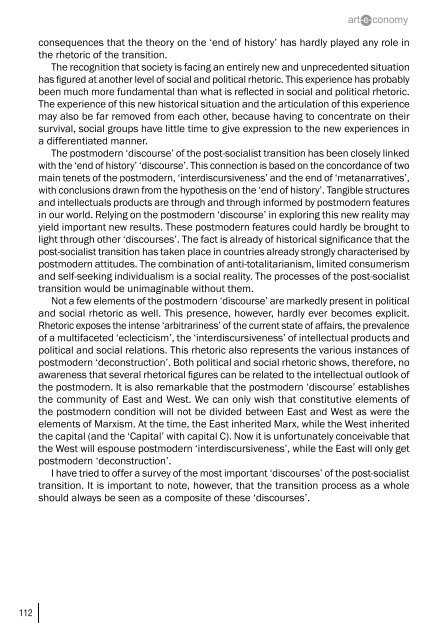art-e-conomy _ reader - marko stamenkovic
art-e-conomy _ reader - marko stamenkovic
art-e-conomy _ reader - marko stamenkovic
Create successful ePaper yourself
Turn your PDF publications into a flip-book with our unique Google optimized e-Paper software.
112<br />
consequences that the theory on the ‘end of history’ has hardly played any role in<br />
the rhetoric of the transition.<br />
The recognition that society is facing an entirely new and unprecedented situation<br />
has figured at another level of social and political rhetoric. This experience has probably<br />
been much more fundamental than what is reflected in social and political rhetoric.<br />
The experience of this new historical situation and the <strong>art</strong>iculation of this experience<br />
may also be far removed from each other, because having to concentrate on their<br />
survival, social groups have little time to give expression to the new experiences in<br />
a differentiated manner.<br />
The postmodern ‘discourse’ of the post-socialist transition has been closely linked<br />
with the ‘end of history’ ‘discourse’. This connection is based on the concordance of two<br />
main tenets of the postmodern, ‘interdiscursiveness’ and the end of ‘metanarratives’,<br />
with conclusions drawn from the hypothesis on the ‘end of history’. Tangible structures<br />
and intellectuals products are through and through informed by postmodern features<br />
in our world. Relying on the postmodern ‘discourse’ in exploring this new reality may<br />
yield important new results. These postmodern features could hardly be brought to<br />
light through other ‘discourses’. The fact is already of historical significance that the<br />
post-socialist transition has taken place in countries already strongly characterised by<br />
postmodern attitudes. The combination of anti-totalitarianism, limited consumerism<br />
and self-seeking individualism is a social reality. The processes of the post-socialist<br />
transition would be unimaginable without them.<br />
Not a few elements of the postmodern ‘discourse’ are markedly present in political<br />
and social rhetoric as well. This presence, however, hardly ever becomes explicit.<br />
Rhetoric exposes the intense ‘arbitrariness’ of the current state of affairs, the prevalence<br />
of a multifaceted ‘eclecticism’, the ‘interdiscursiveness’ of intellectual products and<br />
political and social relations. This rhetoric also represents the various instances of<br />
postmodern ‘deconstruction’. Both political and social rhetoric shows, therefore, no<br />
awareness that several rhetorical figures can be related to the intellectual outlook of<br />
the postmodern. It is also remarkable that the postmodern ‘discourse’ establishes<br />
the community of East and West. We can only wish that constitutive elements of<br />
the postmodern condition will not be divided between East and West as were the<br />
elements of Marxism. At the time, the East inherited Marx, while the West inherited<br />
the capital (and the ‘Capital’ with capital C). Now it is unfortunately conceivable that<br />
the West will espouse postmodern ‘interdiscursiveness’, while the East will only get<br />
postmodern ‘deconstruction’.<br />
I have tried to offer a survey of the most important ‘discourses’ of the post-socialist<br />
transition. It is important to note, however, that the transition process as a whole<br />
should always be seen as a composite of these ‘discourses’.


